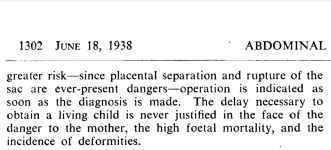Arthur Brain
Well-known member
How so? You seen me going around claiming that I know that God knows other people's thoughts and disapproves of them? Good luck with that...He's quite a hypocrite, isn't he?
How so? You seen me going around claiming that I know that God knows other people's thoughts and disapproves of them? Good luck with that...He's quite a hypocrite, isn't he?
All your former is addressed all over but as to your latter. You're a fallible human being too and nowhere in the Bible is there any justification for the notion of holding five year old children as accountable for their actions as adults to the point of their being tried and executed, even to the point of their being literally stabbed to death if it befitted the nature of their "crime". Indefensible so God may always be right but you assuredly aren't. Your "explanation" is obviously given all the respect it deserves.Taking a child away from his parents is, by definition, kidnapping.
Appeal to the stone.
False.
It provides justice for his death, and deters other parents from neglecting their children.
Nice straw man.
Duh.
Needs are not rights.
A childs needs should be met by his parents. The government cannot fulfill the role of the parents.
False, on both counts.
Sure I do. He tells us what His thoughts are in the Bible. You've told us what your thoughts are (mostly) via TOL.
It's not hard to compare the two.
And since God is always right, and Arthur is a fallible human being, we know that if your thoughts conflict with what God has said, then we know He doesn't approve.
I shouldn't have had to explain that to you, but I did.
If you deny measures that ensure a child has essentials in order to live
A child shouldn't have to rely on 'good fortune'.
it's
If not, then that child should still have the right to the very same
else the alternative is what? Leave the child to rot? There isn't always a relative on standby to take up the slack and even then there's no guarantee that they'd be up to the task either.
"Force others to pay the bill"?
I've no problem with paying taxes to ensure there's child protection services
to step in if a child is being mistreated.
If you truly cared about children you'd have no problem with that either.
Um, no, you do not get this ridiculous
concept that men are designed to have higher sex drives than women from reality JR, you really don't.
You seen me going around claiming that I know that God knows other people's thoughts and disapproves of them? Good luck with that...
You're a fallible human being too
... so God may always be right but you assuredly aren't.
Thanks for pointing out the hypocrisy of those who would deny social safety nets for mother and baby after the baby is born.
What about nonviable pregnancies?

Ectopic pregnancies are survivable by both mother and child. Usually all it takes is to relocate the embryo to the uterus.
No ectopic pregnancy can be saved. You are wrong.
No ectopic pregnancy can be saved. You are wrong.


Fact Sheet on Ectopic Pregnancy
Documented refutations of the three big lies about ectopic pregnancywww.personhoodinitiative.com
Find me a scientific source. Thanks in advance.
That's false.
And I just showed you proof.
Don't just dismiss the evidence because it doesn't fit the narrative you've been told.
The best social safety nets are those that are provided by non-governmental agents of societyThanks for pointing out the hypocrisy of those who would deny social safety nets for mother and baby after the baby is born.
The best social safety nets are those that are provided by non-governmental agents of society
I'm sorry, you don't get to murder babies just because people are stupid and callous.
Don't feed the trollI'm sorry, you don't get to murder babies just because people are stupid and callous.
Find me a scientific source. Thanks in advance.
“There is no procedure to reimplant an ectopic pregnancy,” said Dr Chris Zahn, vice-president of practice activities at the American College of Obstetricians and Gynaecologists. “It is not possible to move an ectopic pregnancy from a fallopian tube, or anywhere else it might have implanted, to the uterus,” he said.
“Reimplantation is not physiologically possible. Women with ectopic pregnancies are at risk for catastrophic hemorrhage and death in the setting of an ectopic pregnancy, and treating the ectopic pregnancy can certainly save a mom’s life,” said Zahn.
| 1. The claim that termination of an ectopic pregnancy is necessary to save the life of the mother a. The actual danger that an ectopic pregnancy poses to the mother is that of a tubal rupture or some other kind of hemorrhage which could cause the mother to lose a vital amount of blood. b. Treatment with autotransfusion instead of abortion has a success rate of 99.84%. In 1914, a doctor in Germany reported success in using autotransfusion to treat ruptured ectopic pregnancies.[1] Autotransfusion involves siphoning the blood which has spilled into the abdominal cavity, running it through a filter and then pumping it back into the mother’s body. In 2002, a worldwide study of 632 ruptured ectopic pregnancies treated with autotransfusion reported only a single instance of death.[2] That’s a success rate of 99.84%. c. Based on calculations of ectopic pregnancies in Israel, the lowest possible survival rate for women who do not terminate their ectopic pregnancies prior to rupture or delivery is 88%. The entire southern region of Israel only saw 13 pregnancy related deaths over a 23 year period extending from 1969 to 1991. [3] This comes to an average of .57 deaths per year. In 1992, the Soroka University Hospital in Be’er Sheva reported on 148 ruptured ectopic pregnancies.[4] The report does not provide a range of dates in which these ruptures occurred, but we know that Soroka University Hospital was established in 1960, so we can safely conclude that the 148 ruptured ectopic pregnancies reported by that hospital occurred within a 31 year time period at an average of 4.8 per year. If we assume that every single pregnancy related death in southern Israel was one of these 148 women with ruptured ectopic pregnancies, then we can calculate that a maximum of 12% of ruptured tubal pregnancies result in the death of the mother. Of course, it is highly unlikely that every single pregnancy related death over a period of 23 years was the result of an ectopic pregnancy, and it is equally unlikely that every single one of those deaths occurred at Soroka University Hospital, so that 12% figure must be unrealistically high. Nevertheless, we can safely conclude that women in the southern region of Israel have a greater than 88% chance of surviving a ruptured ectopic pregnancy. d. The actual survival rate is more likely to be 99.4%. A more accurate percentage could be obtained by considering that deaths associated with ectopic pregnancies only make up about 6% of the yearly maternal deaths in America.[5] If this figure were to be applied to the maternal mortality rate of southern Israel, we would derive that there were .03 ectopic related deaths per year for that region. When that figure is divided by an average of 4.8 tubal ruptures per year, we arrive at the conclusion that a woman in southern Israel has a 99.4% chance of surviving an ectopic pregnancy which is not aborted prior to rupture. e. A similar calculation for America produces a lowest possible minimum of 97.7% survival. In addition, we could calculate the maternal risk from the total number of heterotopic pregnancies (twins with one child in the womb and the other being ectopic) in America. According to Dr. Tenore of the Northwestern University Medical School in Chicago, this type of pregnancy occurs in 1 out of every 2,600 pregnancies, and 50% of them (1 out of every 5,200 pregnancies) "are identified only after tubal rupture."[6] According to the American Pregnancy Association, there are approximately 6 million pregnancies per year in the US.[7] Therefore, there are an average of 1,154 heterotopic pregnancies every year in America which are not even discovered much less treated prior to tubal rupture. The CDC reported that there are an average of 26.3 maternal deaths per year that are ectopic related.[8] If we assumed that all of these ectopic related deaths were the result of an undiagnosed heterotopic pregnancy (a condition which only makes up 1% of the total number of ectopic pregnancies), then we would still arrive at a maternal survival rate of 97.7%. 2. The claim that an unborn child cannot survive an ectopic pregnancy a. Between 1809 and 1935, there were 316 reported live births from ectopic pregnancies. Two OBGYNs in New York, Dr.’s Hellman and Simon, published details on 316 ectopic pregnancies which resulted in live births between 1809 and 1935.[9] Only half of these children survived their first week of life, but these births occurred before the development of the first neonatal intensive care unit, and most of them before the discovery of penicillin in 1928. With modern technology, it is likely that many more would have survived. b. With modern technology, there have been even more of these births in recent years in spite of the insistence that abortion is the only viable treatment. In September of 1999, Ronan Ingram was successfully delivered via c-section. Ronan had implanted in one of his mother’s fallopian tubes which subsequently ruptured as he grew into the abdominal cavity.[10] In May of 2008, Durga Thangarajah was born after spending a full nine months in her mother’s ovary.[11] Sage Dalton was born in July of 1999 after developing in the amniotic membrane outside her mother’s womb.[12] Billy Jones was born in 2008 after developing in his mother’s abdominal cavity.[13] Many additional reports could be given.[14] [15] [16] [17] [18] 3. The claim that termination is the only treatment for ectopic pregnancies that is recognized by the medical profession - Many OBGYNs have recommended allowing ectopic pregnancies to resolve on their own. Dr.’s Sapuri and Klufio, for example, have recommended that women discovered to have an ectopic pregnancy prior to 28 weeks of gestation should be admitted to a hospital and closely monitored. They stress that blood transfusion facilities should be readily available in case of hemorrhage, and they suggest that once the child has reached 28 weeks of gestation, he should be delivered surgically.[19] |

“There is no procedure to reimplant an ectopic pregnancy,” said Dr Chris Zahn, vice-president of practice activities at the American College of Obstetricians and Gynaecologists. “It is not possible to move an ectopic pregnancy from a fallopian tube, or anywhere else it might have implanted, to the uterus,” he said.
“Reimplantation is not physiologically possible. Women with ectopic pregnancies are at risk for catastrophic hemorrhage and death in the setting of an ectopic pregnancy, and treating the ectopic pregnancy can certainly save a mom’s life,” said Zahn.

Alright, perhaps I overstated my case, depending on how you took my above statement. However, this does not mean that abortion is the only solution.
